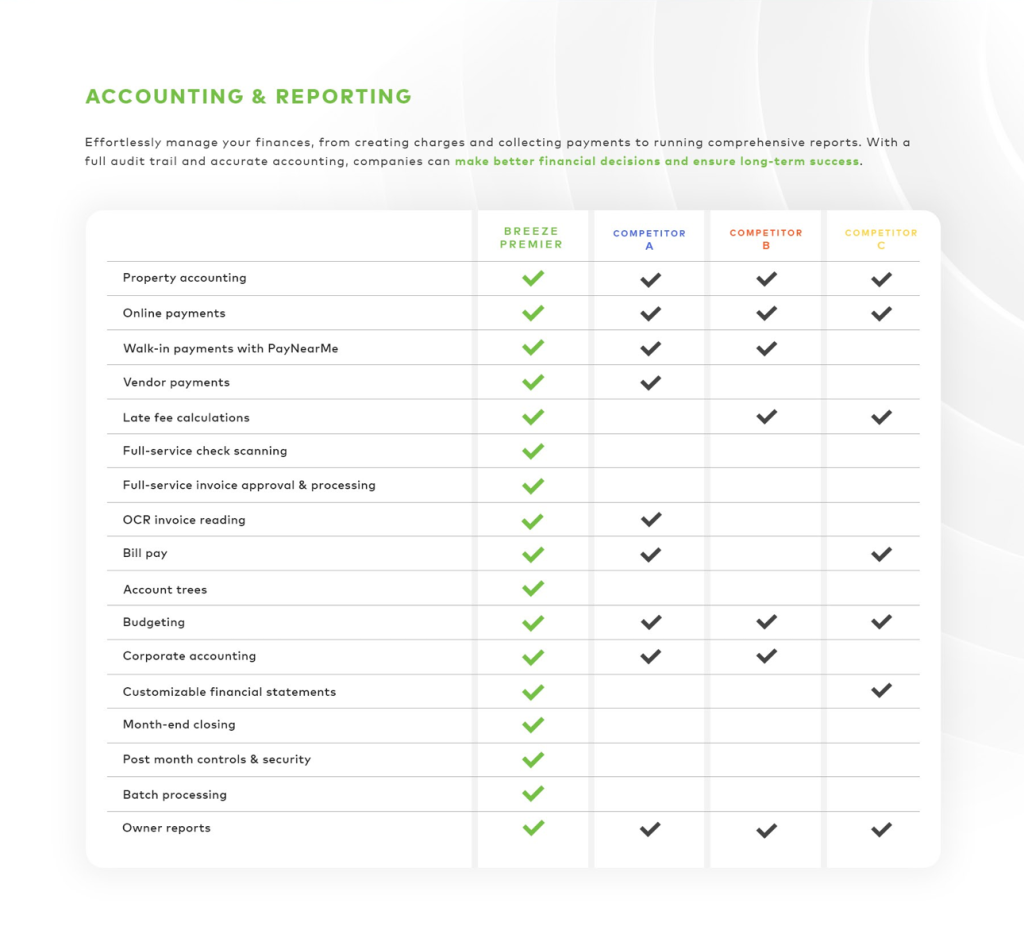
A 2022 study by RETI revealed 64% of property management businesses use spreadsheets as their primary accounting tool. At the same time, many others use basic accounting platforms such as QuickBooks, arguably the best-known bookkeeping software for small businesses in the U.S.
But are these programs really the best fit for you? Probably not, especially when there are solutions specifically designed for property management.
Here’s why. All-in-one property management software is able to handle all your unique needs (e.g., marketing, leasing, accounting, operations). Basic accounting tools can’t do this, which is why it can be challenging to adapt general accounting software like QuickBooks. In this article, we’ll do a quick analysis of QuickBooks for real estate accounting. We’ll look at what it does and doesn’t do for this industry. If you’re at the point where you need to choose between all-in-one property management software like Yardi Breeze and general bookkeeping software like QuickBooks, this read is for you.
QuickBooks for property management
QuickBooks has been popular and reliable accounting software for decades. Many small businesses use it effectively for bookkeeping, but that doesn’t make it an ideal program for property management and real estate accounting.
If you want real estate functionality, QuickBooks needs to be integrated with another solution. You might even need a bookkeeping software to do everything you want to do. This means you’ll have to pay for at least two solutions and manage multiple logins. If you’re looking for a single source of truth in your accounting and reporting, Yardi Breeze and Yardi Breeze Premier are all-in-one systems purposely built for property management with built-in, robust accounting functionality.
In fact, Breeze clients who switch over from QuickBooks or other accounting software frequently cite multiple logins as an irritating and time-consuming problem before implementing Breeze. For example, according to Breeze user Marty Gonzalez, “Managing several multifamily properties with spreadsheets and outdated software created multiple pain points, making it cumbersome and time-consuming to perform even the simplest tasks.”
General accounting software for property management
General accounting software targets multiple markets and business structures. QuickBooks may be a widely used accounting solution, but it’s not specifically designed for real estate accounting. As a result, creative setup and customization is often necessary to make it work.
Furthermore, businesses using QuickBooks will likely outgrow its capabilities and require a more specialized solution. If you’re deciding between property management solutions and bookkeeping software, we encourage you to make a side-by-side comparison. Breeze and Breeze Premier function as all-in-one solutions for marketing, leasing, reporting, accounting, maintenance, rent collection, resident screening, invoice processing and everything else you need to run your business.
All-in-one accounting for property management
Breeze is designed specifically for real estate. Its features cater to the unique requirements of the industry.
Think of property management software this way: accounting software is a one-size-fits-all accounting software, and Breeze is an all-in-one property management solution with robust accounting specifically built for real estate. Many clients and consultants tell us that the lack of a tenant ledger in QuickBooks ends the conversation right then and there, as this critical property accounting feature is a core aspect of Breeze’s built-in accounting suite.
As a single stack solution, Breeze provides a transparent and competitive pricing structure. Perhaps most crucially, it eliminates the need for additional software as well as any integration fees you might incur. Many competing property management and accounting solutions lack robust commercial functionality, important real estate accounting and tax features, appropriate reporting structures, ILS site syndication for property marketing and more.
Unique benefits of dedicated property management software
Unlike some small business structures, property managers require dedicated software for operations and accounting. It’s essential to find a solution that effectively combines both to avoid problems (e.g., double or triple entries) and ensure a seamless user experience. Breeze and Breeze Premier help mitigate risks associated with audits, data inconsistencies and communication breakdowns among team members.
As all-in-one solutions, Breeze offers an unparalleled number of features tailored to property management:
- Rent rolls
- Property-specific reporting
- Tenant portals and lease tracking
- Late fee assessments
- Vendor-related accounting procedures
- Simple, predictable pricing structures
- Powerful commercial functionality
- Industry-leading accounting and tax functionality
- Advanced reporting and flexible analytics
- Built-in job cost functionality
- Regional functionality (e.g., state-based lease docs)
- No delays to receive screening reports
- No additional costs for inspections
- No charges for 1099 electronic filing (others charge $25 per batch and $4 per form)
- Free, unlimited live chat support
- Add-on modules to suit unique needs (e.g., maintenance call center, chatbot, energy solutions, investment management, full-service invoice and check processing)
How does the accounting functionality in Breeze Premier stack up against other property management solutions? Check out the comparison below or see the complete infographic here.

Flip the script: Who would benefit from QuickBooks over Yardi Breeze?
Clients with smaller portfolios — perhaps fewer than 10 units — or those who are just starting out in the industry may be able to use QuickBooks for property management. There will still be workarounds, but with a simple rent roll, difficulties will be kept to a minimum. Nonetheless, Breeze is designed to streamline every aspect of property management, regardless of portfolio size, making it an ideal long-term solution that can adapt as your business grows.
Transitioning from accounting software to property management software
We understand there are challenges when transitioning from one software to another. For some businesses, these challenges are minor, and the process is complete in days or a few weeks. For those with many charts of accounts, multiple property types or other complex setups, switching software can be more involved.
Even if that sounds like a lot, consider what you’d be missing by not switching. Evaluate potential solutions, especially if the long-term benefits outweigh any short-term setbacks. Identify where there’s room for improvements and outdated systems or practices aren’t holding your business back.
Conclusion
We’ll leave you with a quick takeaway. The best bookkeeping software for landlords with small portfolios is the one that comes across as the most honest, open and upfront. It’s the one that does the most at an affordable price you can calculate from the get-go. Before you sign the agreement, you’ll want to know whether there are setup charges, transaction fees, charges for 1099s and other business-critical factors. Assess each potential solution carefully, and don’t be afraid to ask the hard questions during your evaluations.
Further reading: Our friends at Balanced Asset Solutions have this quick primer on Mastering Property Management Bookkeeping. Check it out!
